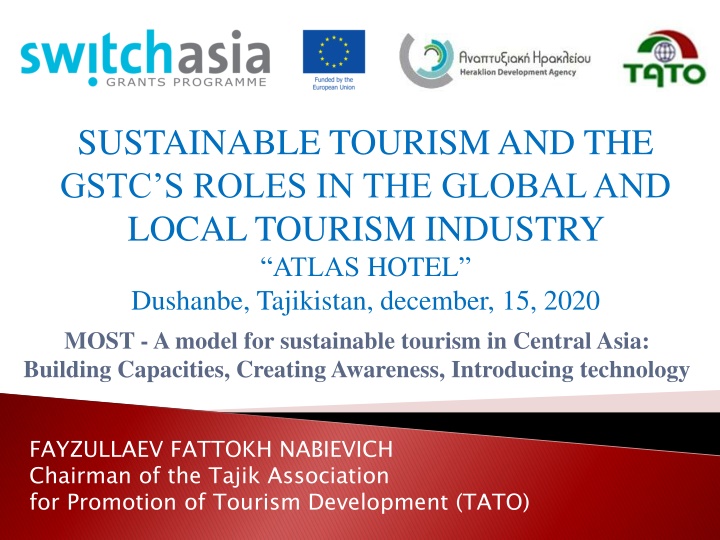
Sustainable Tourism and Global Roles of GSTC
Explore the concept of sustainable tourism and the crucial role of the Global Sustainable Tourism Council (GSTC) in promoting sustainability in the tourism industry. Learn about initiatives in Tajikistan, such as the National Development Strategy and Tourism Development until 2030, aimed at achieving Sustainable Development Goals. Discover how sustainability principles are applied to foster economic, social, and environmental well-being in the local and global tourism sector.
Download Presentation

Please find below an Image/Link to download the presentation.
The content on the website is provided AS IS for your information and personal use only. It may not be sold, licensed, or shared on other websites without obtaining consent from the author. If you encounter any issues during the download, it is possible that the publisher has removed the file from their server.
You are allowed to download the files provided on this website for personal or commercial use, subject to the condition that they are used lawfully. All files are the property of their respective owners.
The content on the website is provided AS IS for your information and personal use only. It may not be sold, licensed, or shared on other websites without obtaining consent from the author.
E N D
Presentation Transcript
SUSTAINABLE TOURISM AND THE GSTC S ROLES IN THE GLOBAL AND LOCAL TOURISM INDUSTRY ATLAS HOTEL Dushanbe, Tajikistan, december, 15, 2020 MOST - A model for sustainable tourism in Central Asia: Building Capacities, Creating Awareness, Introducing technology FAYZULLAEV FATTOKH NABIEVICH Chairman of the Tajik Association for Promotion of Tourism Development (TATO)
SUSTAINABLE TOURISM: - takes into consideration current and future economic, social and environmental impacts, taking into account the needs of tourists, the environment and the host communities. - makes the best use of the key element in tourism development - natural resources, preserves natural heritage and biodiversity, respects the socio-cultural authenticity of the host communities, preserves the cultural heritage and traditional values of the local community - promotes intercultural understanding and tolerance, ensures social and economic benefits for all stakeholders and their equitable distribution, including stable employment and income opportunities, social services for the host communities and poverty reduction.
An independent non-profit organisation that sets standards and guidelines for the application of sustainability principles in travel and tourism. The Global Sustainable Tourism Council (GSTC) Criteria; - - Serve as global baseline standards for sustainability in travel and tourism. - They are used for training development and as a basis for certification. - The criteria are indicators that destinations need to achieve social, environmental, cultural and economic sustainability. and awareness raising, policy businesses, authorities and
NATIONAL POLICIY ON SUSTAINABLE DEVELOPMENT The National Development Strategy of Tajikistan (2016-2030) will define the main directions for achieving Sustainable Development Goals (SDG) in Tajikistan. The aim of the strategy is to improve living standards and well-being of the population through sustainable economic development, energy, transport and food security and other priorities related to health, water, biodiversity, sustainable cities, sustainable energy and climate change. Tajikistan has joined the UN Framework Convention on Climate Change. Measures on implementation of Paris Agreement and NDC (national achievable goals) are implemented through introduction of low-carbon technologies, implementation of energy efficiency, climate and environmental security policies to ensure sustainability to climate change. The Strategy for Tourism Development until 2030 assumes creation of conditions for tourism development of transport and logistics infrastructure for development of tourism business especially in regions with unique natural and climatic conditions and transition from a traditional form of tourism to a model with lower environmental impact. National action plans: National Action Plan for Environmental Protection of the Republic of Tajikistan; National Action Plan of the Republic of Tajikistan on climate change mitigation; National Programme and Action Plan for reducing the impact of ozone-depleting substances;
MOST - A model for sustainable tourism in Central Asia: Building Capacities, Creating Technology Awareness, Introducing A project supported by the European Union (EU) and the Heraklion Development Agency - HDA (2020-2022) to be implemented in the countries of Central Asia, Uzbekistan, Kazakhstan and Tajikistan. The project aims to promote a new structured model of sustainable tourism in Tajikistan, preservation and enhancement of local culture, heritage and traditions as well as the protection of the natural environment. contributing to the
1. To enhance the capacity and role of local and regional authorities in planning and implementing sustainable tourism policies, liaising with investments and other technical support tools from Development Partners and supporting public and policy dialogue among key stakeholders and tourism stakeholders. 2. Capacity building for tourism enterprises (MSMEs); - training focused on increasing their knowledge and information on GSTC criteria for sustainable tourism, relevant standards and certification procedures, green procurement and transfer of best practices and tools to make their operations more sustainable. Equipping targeted tourism enterprises (MSMEs) with standards / certification, software for preparation and real monitoring of water and energy consumption and indoor comfort parameters. - Marketing trainings, identification of financial sources for adaptation of SPC practices, implementation of interaction with investors and Development Partners 3. Activities to raise awareness of the users of tourism services on sustainable water, waste, recycling and energy consumption and to raise public awareness on sustainable tourism.
ACHIEVED RESULTS IN 2020 3 educational trainings in Dushanbe, Khujand and Kulyab trained 50 tourism enterprises on: GSTC criteria for sustainable tourism, relevant standards and green procurement: Sustainable production and consumption and the role of green procurement GSTC Criteria for Sustainable Tourism, Relevant Standards and Green Procurement. Environmental certification. Data collection and management tools for environmental certification. Leminate software, (www.leiminte.com) developed by APINTECH (a cloud- based solution to support, collect and manage data for MOST environmental certification) which will be used to prepare 3 types of certification projects (environmental management initiatives); ISO 14001 environmental management system. Corporate Social Responsibility (CSR) initiatives. Hotel Carbon Measurement Initiative (HCMI).
10 MSMEs in the region will be equipped with monitoring tools and equipment such as energy/water meters, sensors to record indoor quality conditions in the pilot phase in order to introduce new technology to monitor and control energy and environmental parameters. 40 MSMEs in the tourism sector will learn how to use marketing tools; Strengthened dialogue between public authorities and the business sector for sustainable tourism; 30 Local and regional authorities will be supported in policy planning and its linkage to investment and other support instruments; MSMEs' access to funding, from the EU and other international donors and synergies of MSME projects with EU and other funded projects in similar areas in Tajikistan are facilitated. Awareness raising activities have been carried out with the users of tourism services, as well as sensitisation of the population on sustainable tourism. Sustainable Consumption and Production (SCP) practices in the tourism sector have been introduced.
Given the significant tourism potential of Tajikistan, sustainable tourism will lead to economic growth of the country, poverty reduction and achievement of Sustainable Development Goals. Facilitate increase in tourist flow, increase the number of tourist organizations and other small enterprises in the service sector, handicrafts, souvenir production, attract investments and create new workers places. It will promote the development of a "green economy" and encourage the introduction of new technologies and facilitate the transition to low-carbon development, a resource-saving economy in Tajikistan. It will reduce the use of non-renewable resources and prevent environmental degradation and pollution from the development of tourism activities. Consumers will receive adequate knowledge and information on sustainable consumption and lifestyle through the introduction of standards, labeling and participation in sustainable public procurement. Outline the expected impacts on consumption and production patterns, mainly with regards to resources efficiency, climate mitigation, and behavioural change.
! ! Thank for your attention!






















